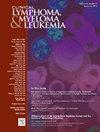SOHO 最新进展和下一个问题:系统性肥大细胞增多症的现有疗法和新兴疗法。
IF 2.7
4区 医学
Q2 HEMATOLOGY
引用次数: 0
摘要
系统性肥大细胞增多症(SM)是一种异质性髓系肿瘤,其特征是肥大细胞(MC)在包括骨髓(BM)和胃肠道在内的≥1个皮外器官中克隆性增殖。在≈90-95%的 SM 患者中,MC 的异常增殖是由 KIT D816V 突变驱动的。惰性SM(ISM)是最常见的SM亚型,可出现各种严重症状。晚期 SM(AdvSM)的预后明显较差。针对突变型 KIT 和肿瘤性 MC 的 KIT 抑制剂的出现使 SM 的治疗模式发生了转变,并显著改善了预后。Midostaurin 开启了 KIT 抑制剂的时代,并于 2017 年获批用于 AdvSM。阿伐替尼是首个高效选择性KIT D816V抑制剂,分别于2021年和2023年在美国获批用于治疗AdvSM和症状性ISM(血小板≥50×109/L)。EXPLORER和PATHFINDER研究对阿伐替尼治疗AdvSM进行了汇总分析,结果表明,阿伐替尼能快速、显著地降低MC负荷指标(≥50%),提高应答率(71-75%),延长生存期。在PIONEER研究中,阿伐替尼显著而迅速地改善了ISM患者的症状/生活质量,并降低了MC负荷指标。在研药物贝珠司替尼和埃仑替尼是 KIT D816V 的高效选择性抑制剂,其血脑屏障穿透性极低。在APEX和SUMMIT研究中,贝珠司替尼分别使≈50%的AdvSM患者和≈90-100%的非AdvSM患者的MC负担指标降低了≥50%,并减轻了症状(≥50%)。在HARBOR研究中,埃仑司替尼对减少ISM患者的MC负担指标和改善症状具有剂量依赖性疗效。本文章由计算机程序翻译,如有差异,请以英文原文为准。
SOHO State of the Art Update and Next Questions: Current and Emerging Therapies for Systemic Mastocytosis
Systemic mastocytosis (SM) is a heterogeneous myeloid neoplasm, characterized by clonal proliferation of mast cells (MCs) in ≥ 1 extracutaneous organs, including the bone marrow (BM) and gastrointestinal tract. Aberrant MC proliferation is driven by mutation KIT D816V in ≈90−95% of SM patients. Indolent SM (ISM) is the most common SM subtype with various symptoms that can be severe. Advanced SM (AdvSM) has markedly poor prognosis. The advent of KIT inhibitors, targeting mutant KIT and neoplastic MCs, led to a paradigm shift in SM management and markedly improved outcomes. Midostaurin inaugurated the era of KIT inhibitors and was approved for AdvSM in 2017. Avapritinib is the first highly potent and selective inhibitor of KIT D816V that was approved to treat AdvSM and symptomatic ISM (platelets ≥ 50 × 109/L), in the US, in 2021 and 2023, respectively. Pooled analysis of the EXPLORER and PATHFINDER studies, assessing avapritinib in AdvSM, demonstrated rapid and profound reductions (≥ 50%) in markers of MC burden, high response rates (71−75%), and prolonged survival. In the PIONEER study, avapritinib significantly and rapidly improved symptoms/quality of life, and reduced markers of MC burden in ISM patients. The investigational agents bezuclastinib and elenestinib are highly potent and selective inhibitors of KIT D816V with minimal blood-brain barrier penetration. Bezuclastinib reduced markers of MC burden by ≥ 50% in ≈50% of AdvSM patients and ≈90−100% of nonAdvSM patients and reduced symptoms (≥ 50%) in the APEX and SUMMIT studies, respectively. Elenestinib demonstrated dose-dependent efficacy in reducing MC burden markers and improved symptoms in ISM patients in the HARBOR study.
求助全文
通过发布文献求助,成功后即可免费获取论文全文。
去求助
来源期刊

Clinical Lymphoma, Myeloma & Leukemia
ONCOLOGY-HEMATOLOGY
CiteScore
2.70
自引率
3.70%
发文量
1606
审稿时长
26 days
期刊介绍:
Clinical Lymphoma, Myeloma & Leukemia is a peer-reviewed monthly journal that publishes original articles describing various aspects of clinical and translational research of lymphoma, myeloma and leukemia. Clinical Lymphoma, Myeloma & Leukemia is devoted to articles on detection, diagnosis, prevention, and treatment of lymphoma, myeloma, leukemia and related disorders including macroglobulinemia, amyloidosis, and plasma-cell dyscrasias. The main emphasis is on recent scientific developments in all areas related to lymphoma, myeloma and leukemia. Specific areas of interest include clinical research and mechanistic approaches; drug sensitivity and resistance; gene and antisense therapy; pathology, markers, and prognostic indicators; chemoprevention strategies; multimodality therapy; and integration of various approaches.
 求助内容:
求助内容: 应助结果提醒方式:
应助结果提醒方式:


